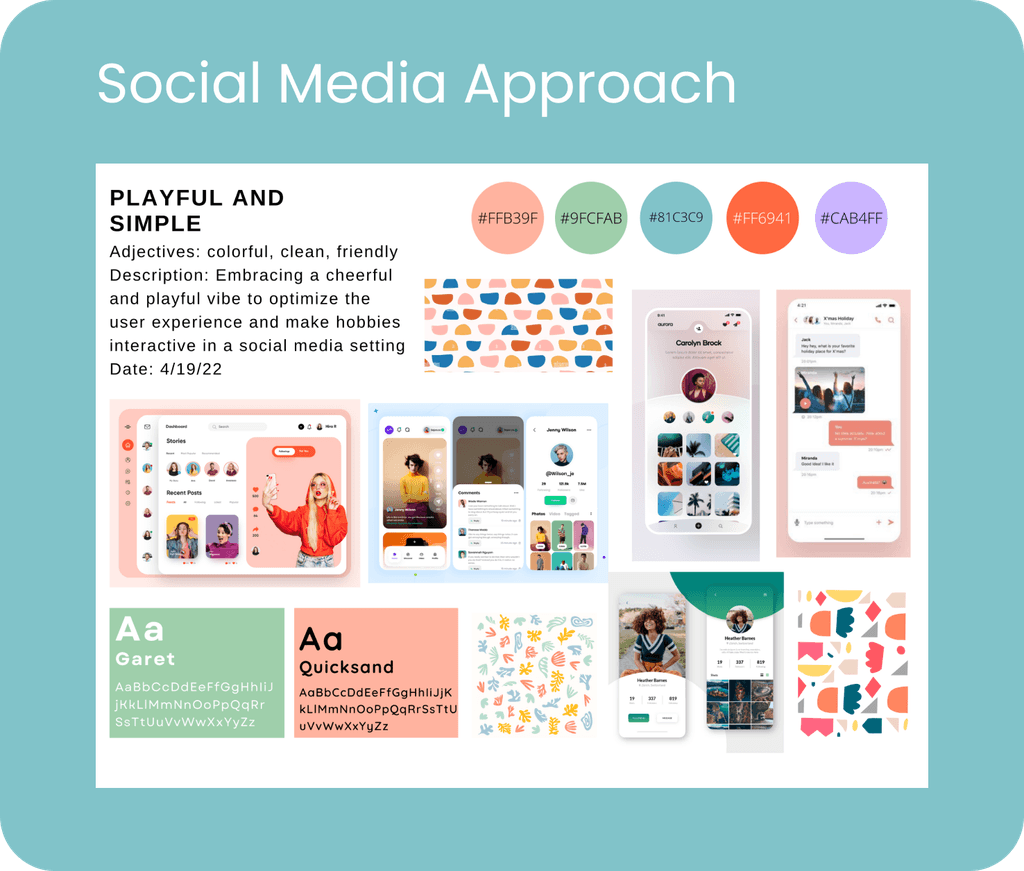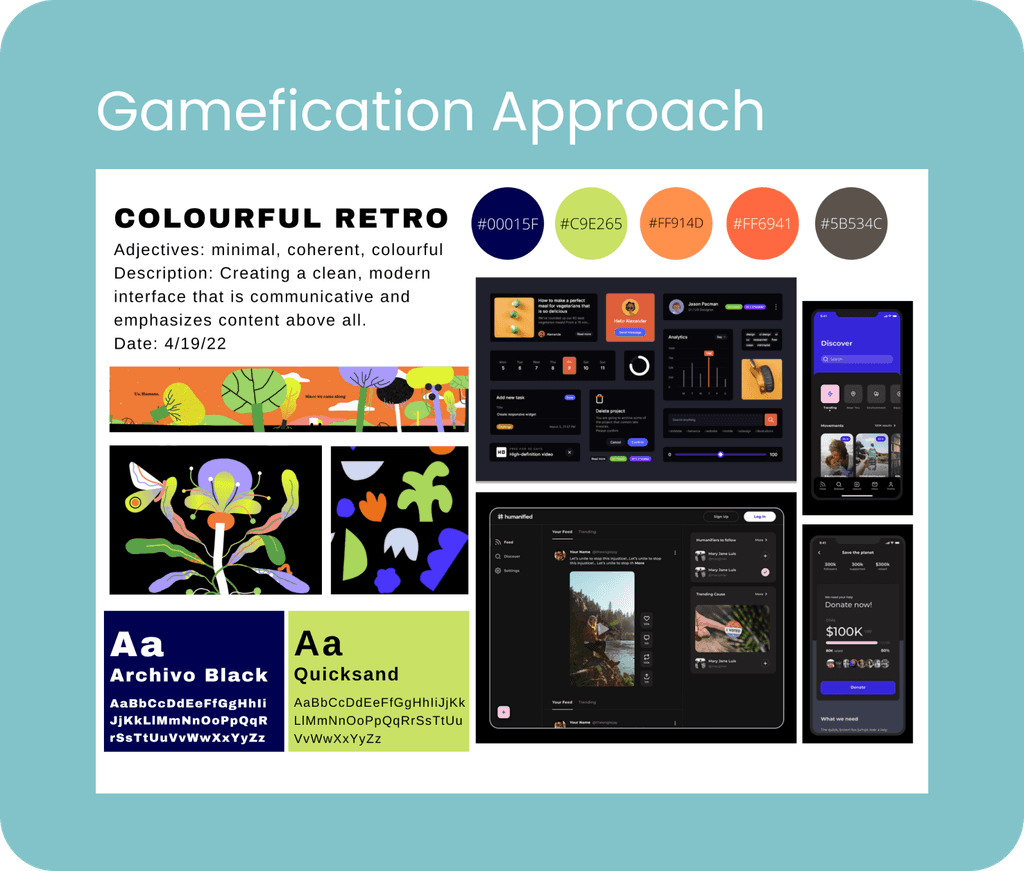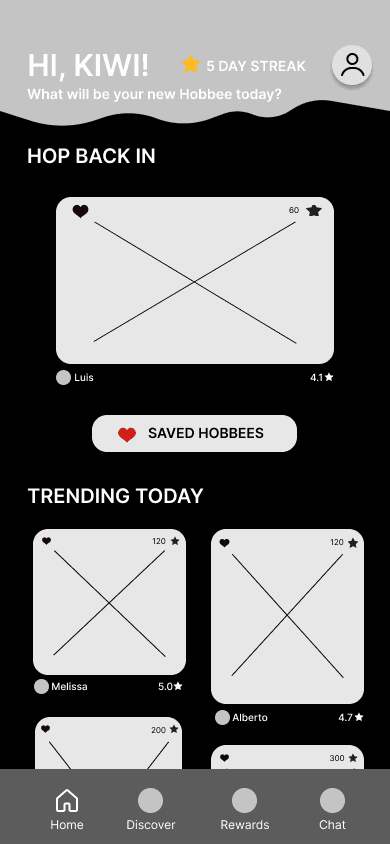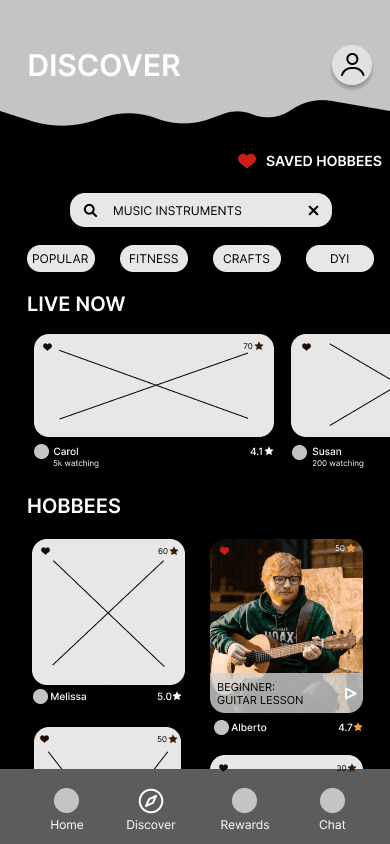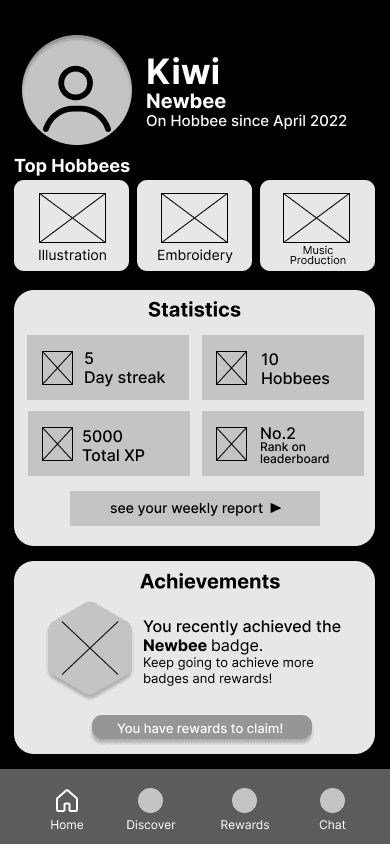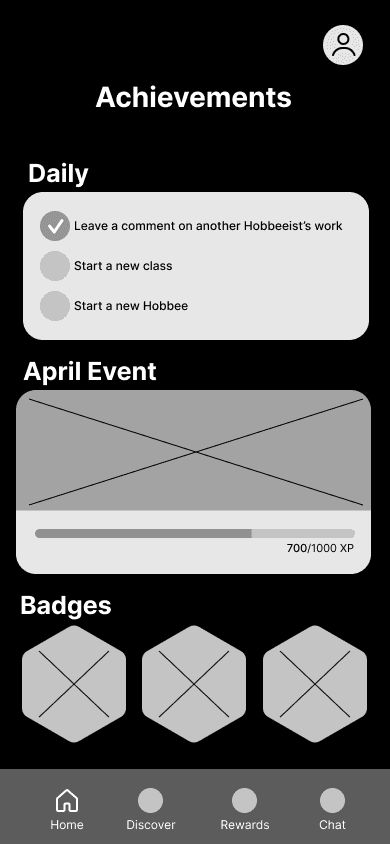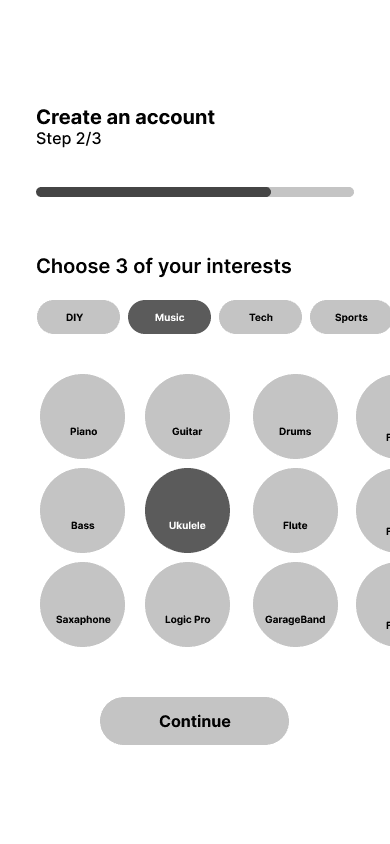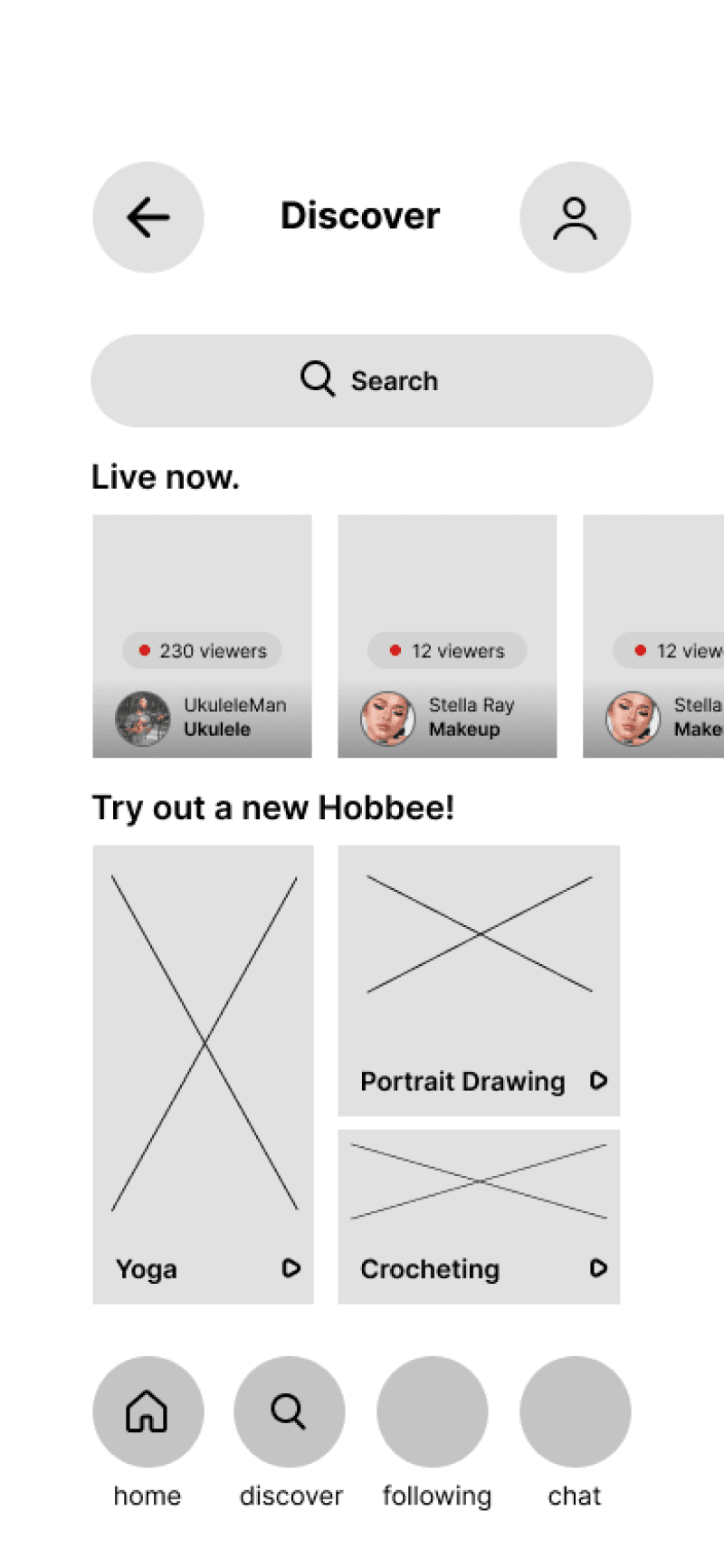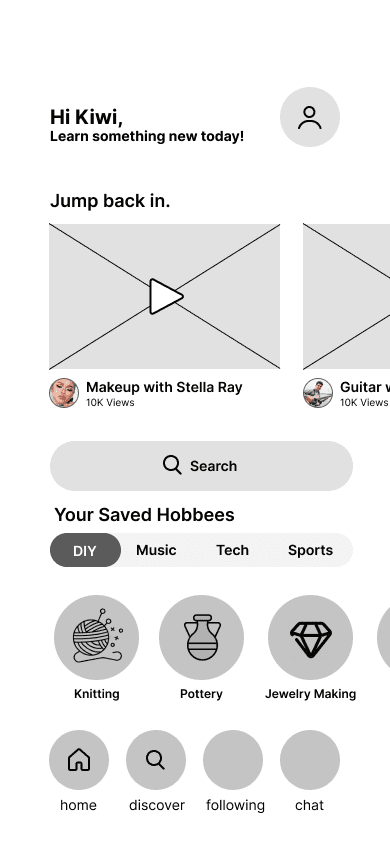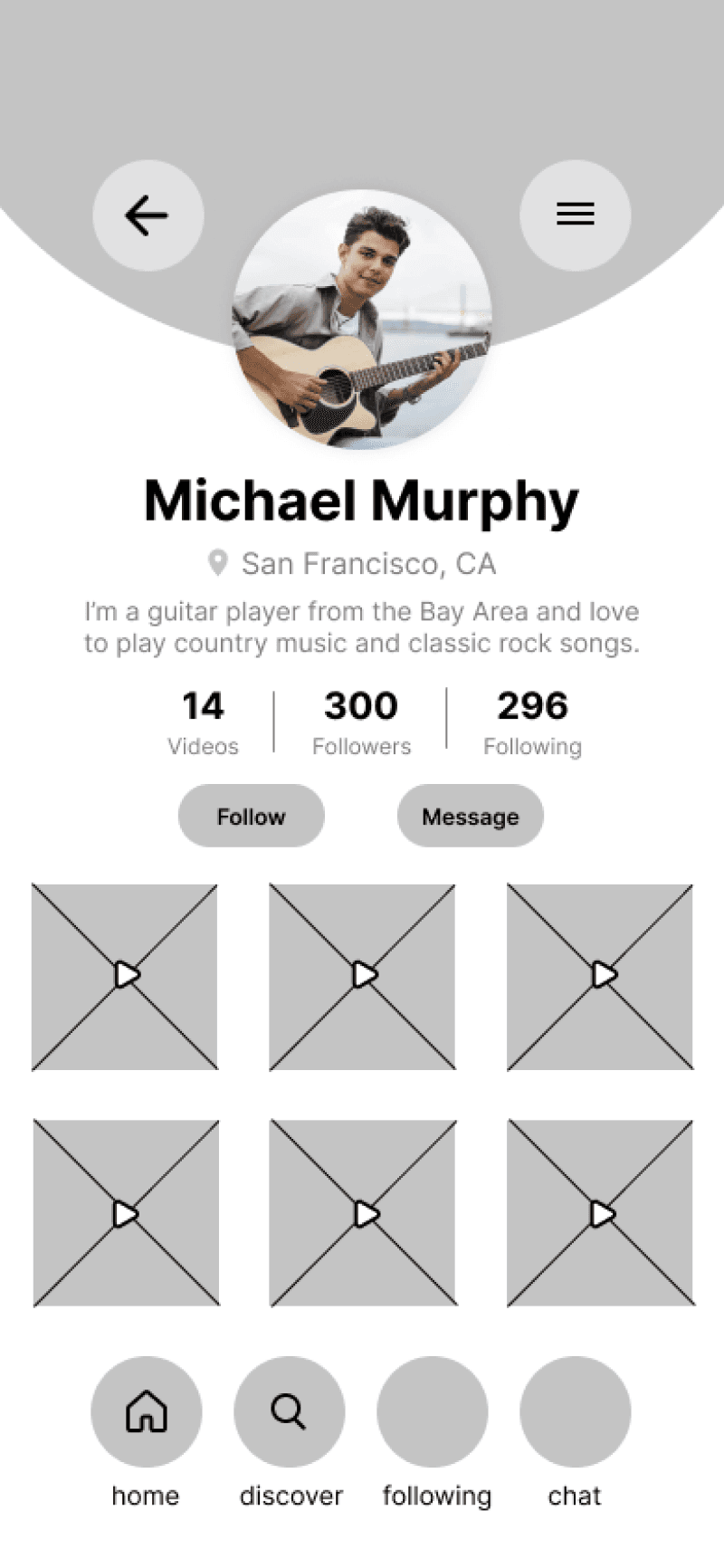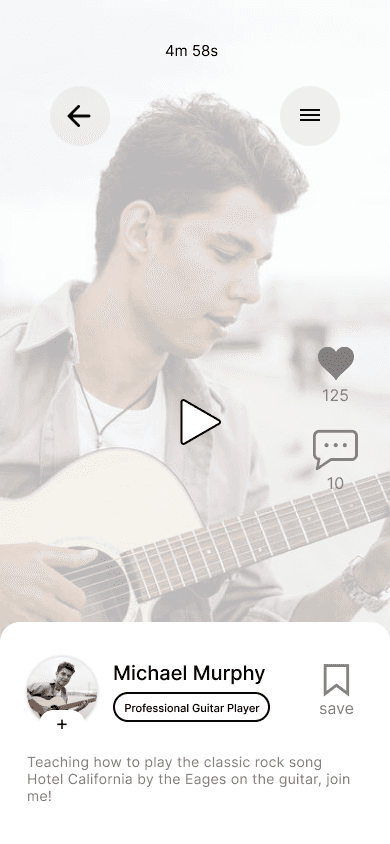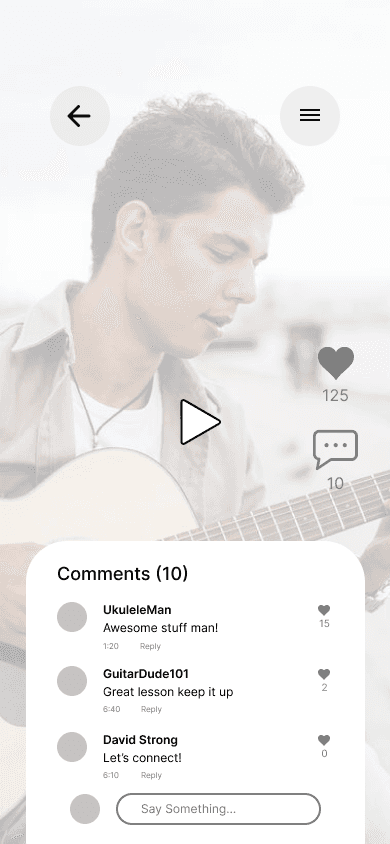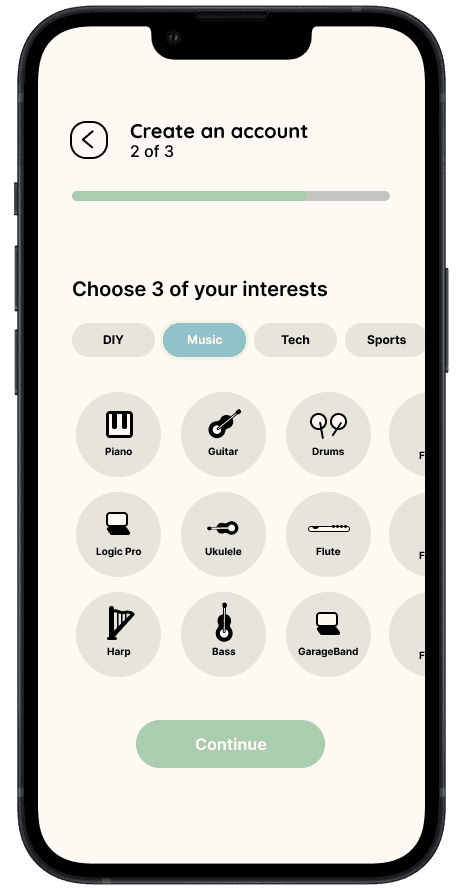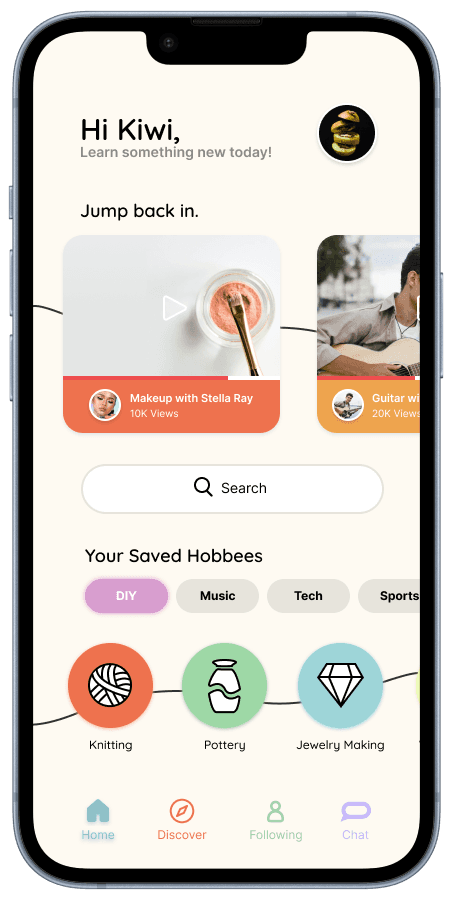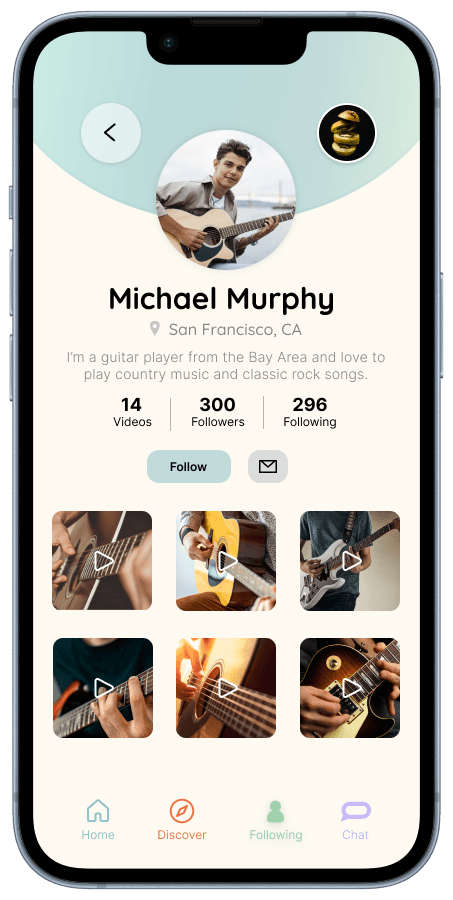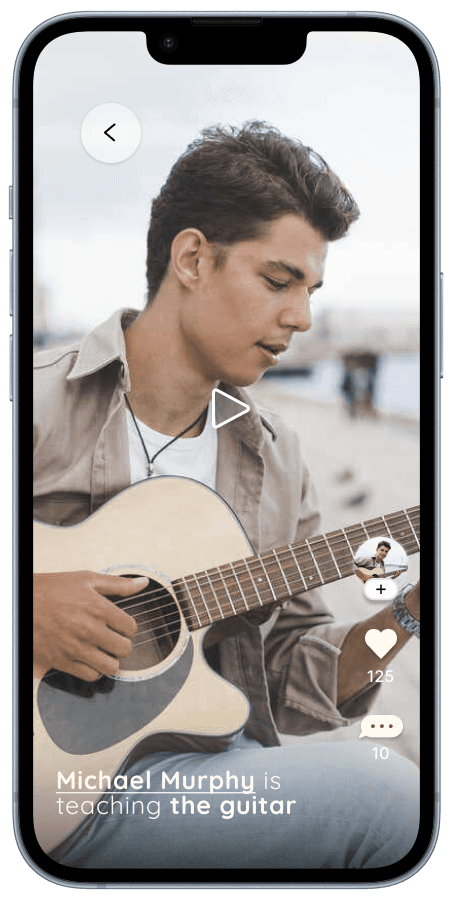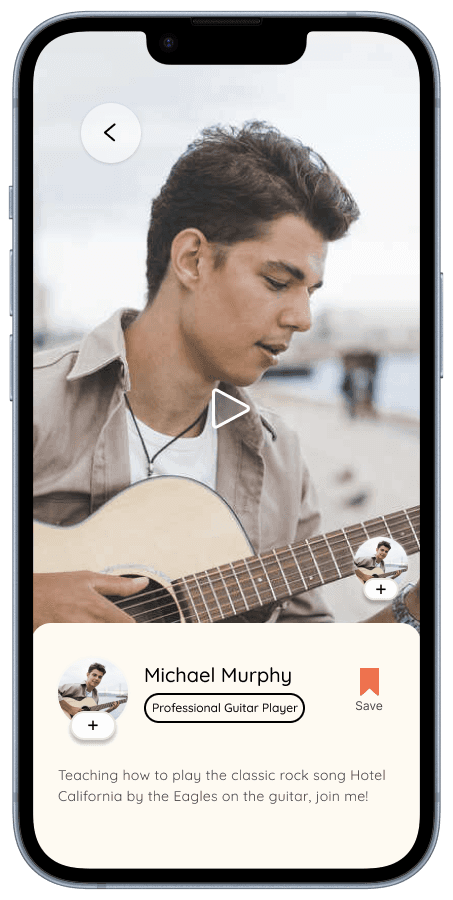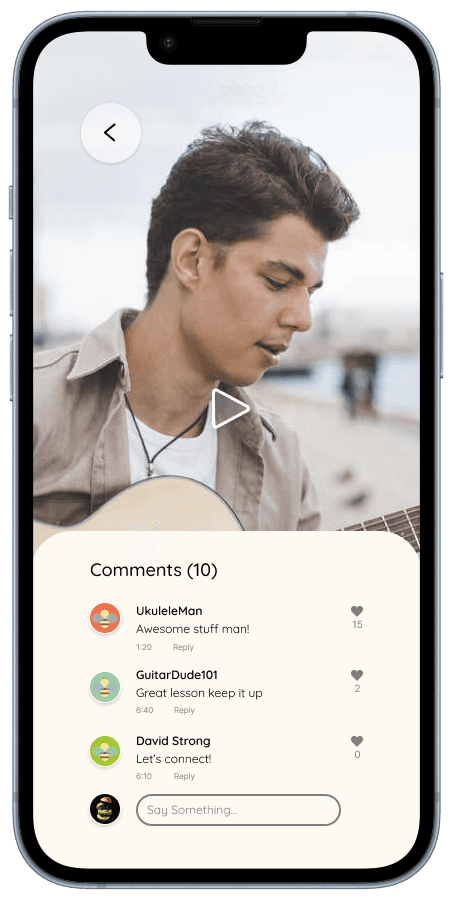Hobbees
Duration: 3 weeks
Tools: Figma
Skills: Prototyping, User Research
Role: UI/UX Designer & Researcher
Team: 3 students
Hobbees
Duration: 3 weeks
Tools: Figma
Skills: Prototyping, User Research
Role: UI/UX Designer & Researcher
Team: 3 students
Hobbees
Duration: 3 weeks
Tools: Figma
Skills: Prototyping, User Research
Role: UI/UX Designer & Researcher
Team: 3 students
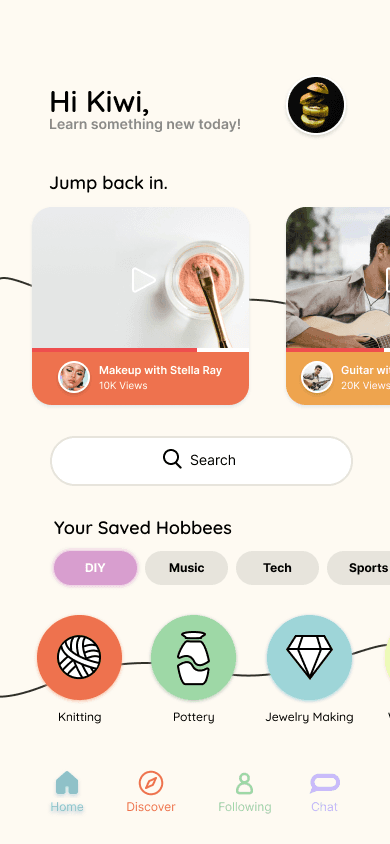





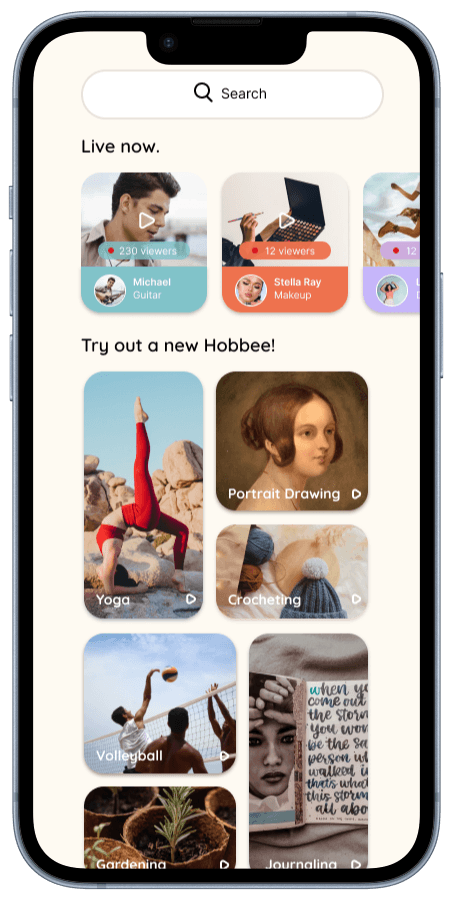













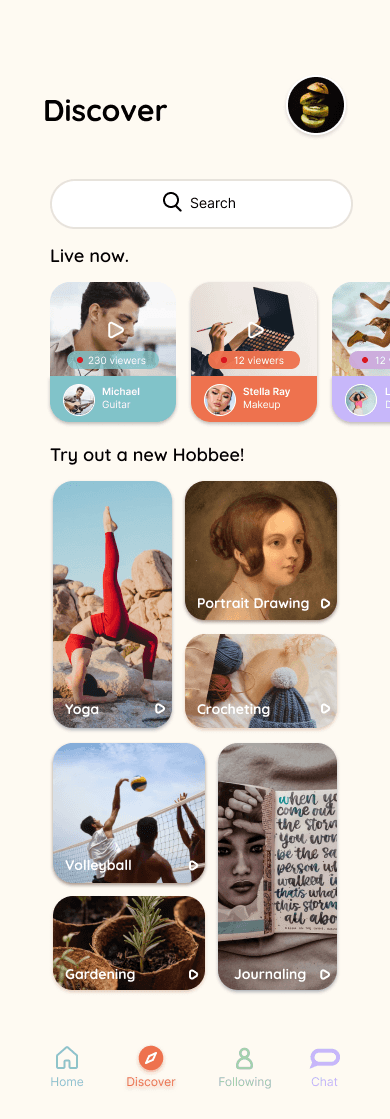




Project Overview
Project Overview
Many people want to learn new hobbies but don’t know where to start
Staying motivated and consistent is difficult without guidance
Finding high-quality, structured learning resources can be overwhelming
Lack of community engagement makes learning feel isolating
Many people abandon hobbies due to frustration or lack of progress
User Research and Insights 💡
User Research and Insights 💡
We conducted interviews with 10+ participants (college students and post-graduate adults) to understand their social experiences and the role hobbies play in forming connections.
Key Findings:
Busy Schedules and Lack of time 🕜
Busy Schedules: College students juggle classes, assignments, part-time jobs, and social activities, leaving little time to explore new hobbies.
Overwhelming Choices: With so many hobby options and online resources, students often don’t know where to start or what’s best for them.
Hobbies as Key Social Connectors 🧗♀️
Post-graduates relied heavily on hobbies like pickleball, group fitness, and music lessons to meet new people. These activities provided structured, low-pressure ways to connect, though they required effort to discover and join.Difficulty Finding Hobby Communities 🫥
Many post-graduates struggled to find local events or hobby groups, often relying on social media or word-of-mouth. Existing platforms (e.g., Meetup, Facebook) felt outdated or ineffective for discovering niche groups.Need for Inclusive, Beginner-Friendly Spaces 🔰
Participants wanted hobby groups that felt welcoming and beginner-friendly, avoiding overly competitive or exclusive environments.Desire for a Centralized Platform 🫂
There was strong interest in a platform that made it easy to discover hobbies and meet people with similar interests, featuring personalized recommendations, group reviews, and social tools to facilitate connections.
Implications for Hobbees
Hobbees should focus on bridging the gap between users and local hobby-based communities by offering seamless discovery, fostering inclusivity, and empowering users to form meaningful connections through shared interests.
We conducted interviews with 10+ participants (college students and post-graduate adults) to understand their social experiences and the role hobbies play in forming connections.
Key Findings:
Busy Schedules and Lack of time 🕜
Busy Schedules: College students juggle classes, assignments, part-time jobs, and social activities, leaving little time to explore new hobbies.
Overwhelming Choices: With so many hobby options and online resources, students often don’t know where to start or what’s best for them.
Hobbies as Key Social Connectors 🧗♀️
Post-graduates relied heavily on hobbies like pickleball, group fitness, and music lessons to meet new people. These activities provided structured, low-pressure ways to connect, though they required effort to discover and join.Difficulty Finding Hobby Communities 🫥
Many post-graduates struggled to find local events or hobby groups, often relying on social media or word-of-mouth. Existing platforms (e.g., Meetup, Facebook) felt outdated or ineffective for discovering niche groups.Need for Inclusive, Beginner-Friendly Spaces 🔰
Participants wanted hobby groups that felt welcoming and beginner-friendly, avoiding overly competitive or exclusive environments.Desire for a Centralized Platform 🫂
There was strong interest in a platform that made it easy to discover hobbies and meet people with similar interests, featuring personalized recommendations, group reviews, and social tools to facilitate connections.
Implications for Hobbees
Hobbees should focus on bridging the gap between users and local hobby-based communities by offering seamless discovery, fostering inclusivity, and empowering users to form meaningful connections through shared interests.
User Personas 👤
User Personas 👤
Meet Emma and Daniel:
FigJam Ideation 🗂️
Feature Categorization:
FigJam Ideation 🗂️
Feature Categorization:
Need To Have:
Creating user profile
Viewing other user profilesDiscovering (e.g., searching and browsing for) different hobbies and skills
Viewing “sharer” profiles and their content
Attending live “classes” or taking previously-recorded classes
Nice To Have:
Saving classes and/or saving them to collectionsViewing other user profiles
Enabling messaging between users and sharers
Accessory/Add-Ons:
Viewing interesting statistics/insights about your up-skilling and hobby-building habits
Suggest content based on the users interests and habits
Rewarding sharers (different models - payment, donations, or even free)



Need To Have:
Creating user profile
Viewing other user profilesDiscovering (e.g., searching and browsing for) different hobbies and skills
Viewing “sharer” profiles and their content
Attending live “classes” or taking previously-recorded classes
Nice To Have:
Saving classes and/or saving them to collectionsViewing other user profiles
Enabling messaging between users and sharers
Accessory/Add-Ons:
Viewing interesting statistics/insights about your up-skilling and hobby-building habits
Suggest content based on the users interests and habits
Rewarding sharers (different models - payment, donations, or even free)
Information Architecture:
Key Features:
Onboarding
Home Page
Discover Page
Following Page
Chat Page
Livestream Page
User Profile/Sharer Profile (Content Creators) Screen




Information Architecture:


Key Features:
Onboarding
Home Page
Discover Page
Following Page
Chat Page
Livestream Page
User Profile/Sharer Profile (Content Creators) Screen
Use Cases:
We created 3 user flows
Discovering a New Hobby
Finding a new connection with common interests
Watching and interacting on a Livestream


Use Cases:
We created 3 user flows
Discovering a New Hobby
Finding a new connection with common interests
Watching and interacting on a Livestream
Design Concepts
Design Concepts
Social Media Approach 🫂
This approach focuses on fostering genuine social interaction through common interests and community building. It would offers a simple, pastel-colored interface that invites users to explore and engage effortlessly, and emphasize local connections, allowing individuals to meet and bond over common interests both online and in their neighborhoods. By prioritizing user-friendly design and a welcoming atmosphere, the social media approach aims to enrich social experiences and cultivate meaningful relationships.
Social Media Approach 🫂
This approach focuses on fostering genuine social interaction through common interests and community building. It would offers a simple, pastel-colored interface that invites users to explore and engage effortlessly, and emphasize local connections, allowing individuals to meet and bond over common interests both online and in their neighborhoods. By prioritizing user-friendly design and a welcoming atmosphere, the social media approach aims to enrich social experiences and cultivate meaningful relationships.
Gameification Approach 👾
This approach focuses on transforming hobby exploration into an engaging adventure. This version encourages users to earn points and rewards for the hobbies they learn and the lessons they attend, turning personal growth into a fun challenge. By integrating game mechanics, it would motivate users to expand their interests while fostering connections with others who share their passions.With every new hobby mastered, users unlock opportunities for community engagement and collaboration, creating a vibrant ecosystem of learners and enthusiasts.
Gameification Approach 👾
This approach focuses on transforming hobby exploration into an engaging adventure. This version encourages users to earn points and rewards for the hobbies they learn and the lessons they attend, turning personal growth into a fun challenge. By integrating game mechanics, it would motivate users to expand their interests while fostering connections with others who share their passions.With every new hobby mastered, users unlock opportunities for community engagement and collaboration, creating a vibrant ecosystem of learners and enthusiasts.
Moodboards 🎨
Moodboards 🎨
Based on the two design concepts we brainstormed we developed two potential moodboards that we could use.
Based on the two design concepts we brainstormed we developed two potential moodboards that we could use.
Low-Fidelity Wireframes 📝
Low-Fidelity Wireframes 📝
Utilizing the two moodboards we developed low-fidelity wireframes for each design concept.
Utilizing the two moodboards we developed low-fidelity wireframes for each design concept.
Gamification Approach 👾
Gamification Approach 👾
Social Media Approach 🫂
User Feedback 🧑💻
User Feedback 🧑💻
During a user consultation with 10 participants (5 students and 5 post-graduate adults), we compared the two wireframe approaches: a social media concept and a gamification approach in brief remote interviews.
The feedback revealed a strong preference for the social media concept, as it facilitated more genuine connections and meaningful interactions.
Users felt that the gamification approach, while engaging, placed too much emphasis on earning points and completing hobbies quickly rather than fostering lasting relationships. This feedback emphasized the importance of community-driven features for building authentic connections.
Design System 📏
Design System 📏
After receiving user feedback based on both of our wireframes from the same students we originally interviewed, we decided to develop our high-fidelity mockups using the Social Media Approach. First we developed a design system to follow.
After receiving user feedback based on both of our wireframes from the same students we originally interviewed, we decided to develop our high-fidelity mockups using the Social Media Approach. First we developed a design system to follow.
Logos
Hobbees
Hobbees








Font Guide: Inter
Subtitle
Regular - 20px
Medium - 20px
SemiBold - 20px
Bold - 20px
Body 1
Regular - 16px
Medium - 16px
SemiBold - 16px
Bold - 16px
Body 2
Regular - 14px
Medium - 14px
SemiBold - 14px
Bold - 14px
Metadata
Regular - 12px
Medium - 12px
SemiBold - 12px
Bold - 12px




Font Guide: Quicksand
Heading 1
Regular - 30px
Medium - 30px
SemiBold - 30px
Title
Regular - 24px
Medium - 24px
SemiBold - 24px
Bold - 24px
Subtitle
Regular - 20px
Medium - 20px
SemiBold - 20px
Bold - 20px
Body 1
Regular - 16px
Medium - 16px
SemiBold - 16px
Bold - 16px
Body 2
Regular - 14px
Medium - 14px
SemiBold - 14px
Bold - 14px
Color Guide
Primary Colors
#81C3C9
#EE724E
#6FC586
#9FCFAB
#ECFAB6
#EE4E4E
#D89ECF
Neutral Colors
#FEFAF2
#DBDBDB
#E7E4DC
#878787
#000000
#FFFFFF
Text Colors
#000000
#FFFFFF
#878787
Margin, padding, paragraph width
Vertical padding: 12
Horizontal padding: 12
Vertical gap: 16
Horizontal gap: 12
Input Boxes
Default
Left Icon
Placeholder text
Placeholder Text
Placeholder Text
Grid
Buttons
Button
Default
Primary
Icon + Text
Icon only
Active
Button
Button
Button
Button1
Button1










High Fidelity Mockups 📱
High Fidelity Mockups 📱
Final Protoype
Reflection & Takeaways 💭
Reflection & Takeaways 💭
Working on Hobbees provided valuable insights into the challenges post-graduate adults face when trying to build connections through hobbies, as well as the importance of seamless hobby discovery for both college students and adults. Throughout the project, I focused heavily on designing an intuitive way for users to discover hobbies and connect with like-minded individuals through group and event profiles. However, there are a few areas where I see potential for growth and improvement.
What I Would Focus on with More Time 🕖 :
Community and Chat Features 💬
If I had more time, I would further develop the community aspect of the app by expanding the chat functionality and finding people in your local area. This feature could include group chats for specific hobbies, one-on-one messaging, and prompts that help users break the ice. Enhancing this feature would make it easier for users to transition from discovering hobby groups to forming meaningful connections within them.Usability Testing Process
Did not have time to conduct usability testing and only user feedback sessions
Key Takeaways:
Provided valuable insights into the challenges post-graduate adults face when trying to build connections through hobbies, as well as the importance of seamless hobby discovery for both college students and adults
Balance Between Discovery and Personalization 🔎 : Users want both an easy way to find local activities and the ability to tailor their experiences to reflect their unique interests and goals. Personalized profiles and communication features can help strike this balance.
Iterative Design Process 🔄 : This project reinforced the value of iteration and feedback. User feedback highlighted areas I hadn’t prioritized initially, such as a more robust communication feature and user-centric profile designs, underscoring the importance of adaptability in design.
In future iterations, I would focus on building a stronger community experience within Hobbees, ensuring that users not only find hobbies but also build lasting connections with others who share their passions.
Working on Hobbees provided valuable insights into the challenges post-graduate adults face when trying to build connections through hobbies, as well as the importance of seamless hobby discovery for both college students and adults. Throughout the project, I focused heavily on designing an intuitive way for users to discover hobbies and connect with like-minded individuals through group and event profiles. However, there are a few areas where I see potential for growth and improvement.
What I Would Focus on with More Time 🕖 :
Community and Chat Features 💬
If I had more time, I would further develop the community aspect of the app by expanding the chat functionality and finding people in your local area. This feature could include group chats for specific hobbies, one-on-one messaging, and prompts that help users break the ice. Enhancing this feature would make it easier for users to transition from discovering hobby groups to forming meaningful connections within them.Usability Testing Process
Did not have time to conduct usability testing and only user feedback sessions
Key Takeaways:
Provided valuable insights into the challenges post-graduate adults face when trying to build connections through hobbies, as well as the importance of seamless hobby discovery for both college students and adults
Balance Between Discovery and Personalization 🔎 : Users want both an easy way to find local activities and the ability to tailor their experiences to reflect their unique interests and goals. Personalized profiles and communication features can help strike this balance.
Iterative Design Process 🔄 : This project reinforced the value of iteration and feedback. User feedback highlighted areas I hadn’t prioritized initially, such as a more robust communication feature and user-centric profile designs, underscoring the importance of adaptability in design.
In future iterations, I would focus on building a stronger community experience within Hobbees, ensuring that users not only find hobbies but also build lasting connections with others who share their passions.


